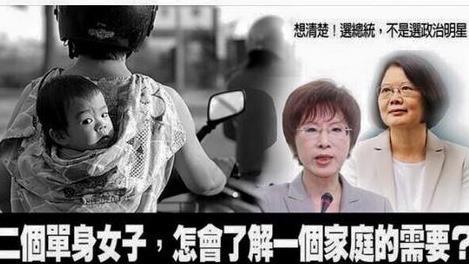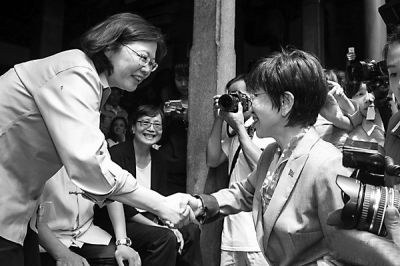by Brian Hioe
語言:
English
Photo Credit: UDN/Apple Daily
PEOPLE FIRST PARTY presidential candidate James Soong would recently draw controversy after a campaign ad lashing out at DPP and KMT presidential candidates Tsai Ing-Wen and Hung Hsiu-Chu on the basis of their both being unmarried women. The ad, which featured the slogan: “How can two single women possibly understand the needs of a family?” would seem to suggest that Taiwan’s next president need to conform to the heteronormative, nuclear family—and that this is apparently of vital importance to the proper governance of Taiwan. Although Soong is widowed, Soong has two children. Tsai and Hung are both unmarried and have no children.
 The ad in question from the People First Party. Photo credit: People First Party
The ad in question from the People First Party. Photo credit: People First Party
Actually, this kind of discourse about gender, family, and what counts as good governance is nothing new in the campaign. International media have seized upon the fact that leading presidential candidates Tsai Ing-Wen and Hung-Hsiu Chu are both women—meaning that Taiwan will very likely have a woman as its next president regardless of who wins. But if this has led to the perception that Taiwan is an apparent bastion of women’s rights as compared to other Asian countries, China’s near total lack of female political leadership in its government being an often drawn comparison, we might point instead to how Tsai and Hung have come under attack from the male-dominated political establishment on gender-based grounds. Such attacks usually are along similar lines as Soong’s.
Tsai Ing-Wen, for example, has long been accused of being a closeted lesbian as an unmarried woman in her late 50s. So, then, would we see something as disgraced former DPP chairman Shih Ming-Teh’s attempt at an attack on Tsai in 2011 in calling for Tsai to come clean about her sexual orientation, claiming that “[Tsai] needs to be true to herself, her body, in order to be true to her beliefs and her country.” For Shih, apparently, if Tsai could not be true to her body, that marks her as unfit for becoming the next president of Taiwan. Regardless of whether such allegations are true or not, allegations that Tsai is a closeted lesbian are longstanding. Presumably that no such accusations have followed suit with Hung as an unmarried female presidential candidate is because of the KMT’s deep-rooted anti-gay prejudice, although there are also longstanding accusations that current Taiwanese president Ma Ying-Jeou is gay, mostly from his critics.
Indeed, one may scoff at Shih, who dropped his own presidential bid as an independent candidate in mid-September almost unnoticed by anybody. But what is shared between Shih and Soong would apparently be the view that the sexual life of a presidential candidate has some connection to that individual’s ability to govern as president. The connection which is posed in such sentiments as we can see in Shih or Soong is moral in nature, the idea being that a presidential candidate needs to be possessed of certain moral qualities in order to be qualified to govern. In putting forth the primacy of heterosexuality or the heterosexual family as a moral qualifier which is lacking in Tsai or Hung, the heteronormative nuclear family is asserted as the basic building block of the moral fabric of society. This is, apparently, what Tsai and Hung are lacking in. In that respect, they are threatening to social order as founded upon the family and established social values as they originate in the family.
To be sure, in consideration of the male-dominated establishment of both KMT and DPP alike, it is in fact quite remarkable that for 2016 elections we see the emergence of two female presidential candidates. Where the DPP is concerned, Tsai has during the course of her current campaign rather remarkably been able to win over the lingering but influential elements within the DPP from its early days who remain committed to a very male-centered vision of Taiwanese nationalism and largely conceive of their aspirations for the Taiwanese nation-building project in terms of the reproduction of the family order—a set of political positions which today we might label “Right Independence”. If anything, Tsai’s ability to win over these elements of the DPP over in spite of any smears made against her character is probably a testament to Tsai’s charisma and skill as a politician.
But if it is mostly coincidence that Hung Hsiu-Chu became the presidential candidate of the KMT for 2016 elections, we might also note that Hung seems to have been set up for a fall on the basis of her gender. The KMT has never had a female presidential candidate before Hung and so in this way, for better or worse, Hung has achieved a first in the party history of the KMT. Yet if 2016 elections were deemed to be unwinnable for the KMT in the aftermath of nine-in-one elections, leading to heavyweight KMT politicians to keep out of the race until very recently in which it appear that Eric Chu may replace Hung, perhaps it was vaguely in some way that Hung was set up for a fall—as a woman.
 A past meeting between Tsai and Hung. Photo credit: CNews
A past meeting between Tsai and Hung. Photo credit: CNews
That is, it may have been that Hung’s being the first female presidential candidate of the KMT is not the sign of any progress on the part of the KMT, but because the present race was deemed to be largely unwinnable. So the KMT—very much a male-dominated establishment—might as well have a female presidential candidate. But now that it looks like Hung will be pushed out in favor of Eric Chu. Apart from indicating that the KMT is not ready to give up this election even if it means accentuating internal divisions within it, however unwinnable it may seem. This also means Hung will likely be suffer smears about the implosion of her campaign on the basis of her being a woman in the near future.
If we are point to an origin for these social attitudes towards Tsai and Hung in the media, perhaps it is in Confucian values as they exist within Taiwanese society and Taiwanese political culture. What we see in the discourse about gender, the family, and the state which would suggest that having a family is a moral qualifier for good governance is the Confucian notion of the family as the constitutive building block for a morally just society. If we might beware the culturalist use of Confucianism to explain social phenomena in non-western contexts, for example with the claim that Confucianism is the hidden engine to the successes of the East Asian economic model, it is true that Confucian social values exist within Taiwanese society as an ideal for a moral order to be strived towards. If we see something similar in America with an emphasis on family values by Republicans, this is a moral order in terms of the family which is thought of in terms of Christianity.
More broadly, we might point towards how Confucianism remains a discourse in which politics is seen to coincide with morality, but specifically a set of moral values about state and family which are conservative in nature. It is in this way that values of social conservativism persist within political discourse, by which the heteronormative nuclear family and the values represented by it provides for a conservative vision of society which political candidates of varying stripes cannot differ from too much, for fear otherwise they would never win the approval of mainstream of voters. But in Taiwan, as with other Asian countries, it remains to be seen how such change would happen.



